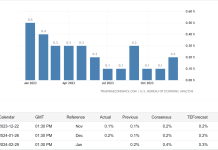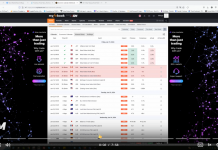 Apart from the Eurozone’s CPI inflation for March 2018 data publishing on Wednesday April 18th 2018, one more data release may affect the foreign exchange (Forex) markets. On that day, the Office for National Statistics (ONS) will publish data regarding the United Kingdom’s CPI (Consumer Price Index) inflation during March 2018. The CPI is an indicator used to measure the rate at which the prices of goods and services bought by households rise or fall, which is the rate of inflation, referred to as the CPI inflation.
Apart from the Eurozone’s CPI inflation for March 2018 data publishing on Wednesday April 18th 2018, one more data release may affect the foreign exchange (Forex) markets. On that day, the Office for National Statistics (ONS) will publish data regarding the United Kingdom’s CPI (Consumer Price Index) inflation during March 2018. The CPI is an indicator used to measure the rate at which the prices of goods and services bought by households rise or fall, which is the rate of inflation, referred to as the CPI inflation.
A Danske Bank report, published on Monday April 16th 2018, forecast that the UK’s CPI inflation in March 2018 remained unchanged at 2.7%, on an annualised basis. Analysts at Danske Bank noted that the core CPI inflation may have risen from 2.4% recorded in February 2018 to 2.5% in March 2018. Core CPI inflation is inflation excluding the prices of seasonally volatile products such as food and energy. The Danske Bank report also said that “our base case is still that CPI inflation will move lower this year, as food price inflation has peaked, energy prices are stabilising and the impact of past British Pound depreciation is fading.” Market participants will be expecting to see if the UK’s CPI inflation remained stable or dropped further since February 2018. A drop towards the Bank of England’s (BoE) 2% target may strengthen the British Pound against its competitors.
Data published by the ONS, on March 20th 2018, showed that inflation in February 2018 recorded a drop from 3% on January 2018 to 2.7%. The drop surprised economists since it exceeded their expectations. The 2.7% inflation rate in February 2018 was the lowest rate recorded since July 2017. The ONS report accompanying the survey’s results said that “the largest downward contributions to the change in the rate came from transport and food prices, which rose by less than a year ago. Falling prices for accommodation services also had a downward effect.”
Economists discuss about potential BoE rate hike
On May 10th 2018, the BoE’s Monetary Policy Committee (MPC) will convene to decide on interest rates. Analysts forecast that the BoE will decide to hike interest rates. Ian McCafferty, who is one of top BoE’s policymakers, told Reuters network that the possibility of faster pay rises and the recent pick-up in the world economy could be reasons that would lead the BoE to raise borrowing costs. Ian McCafferty commented that “we shouldn’t dally when it comes to tightening monetary policy modestly,” adding that wage growth in the UK might prove stronger than expected, forcing inflation to rise.
Economists at ING (Internationale Nederladen Groep) suggested in a report, released on April 16th 2018, that an interest rate hike in the BoE’s upcoming May 2018 meeting “looks increasingly like a done deal.” They note in their report that “signs of rising wage growth combined with recent Brexit progress now means markets have a rate rise in May 2018 virtually priced in. None of the four BoE speakers (Andie Haldane, Ian McCafferty, Ben Broadbent and Gertjan Vlieghe) last week (9/4-13/4/2018) made any attempts to rein in these expectations. Nomura’s analysts forecast in their report, published on April 13th 2018, that the BoE will raise borrowing costs twice per year in 2018 and 2019.
STO and the British Pound
The British Pound against the US Dollar, the Euro and the Japanese Yen are just some of the currency pairs you can trade with on the STO online trading platform. Traders can take advantage of the STO’s Forex variety and choose from over 30 currencies when trading. STO provides its clients with educational courses to help them encounter the various trading challenges.
Trading Forex and CFDs, which are leveraged products, are high risk investments and puts your capital at risk. You may sustain a loss of some or all of your invested capital. Only speculate with money you can afford to lose.
















